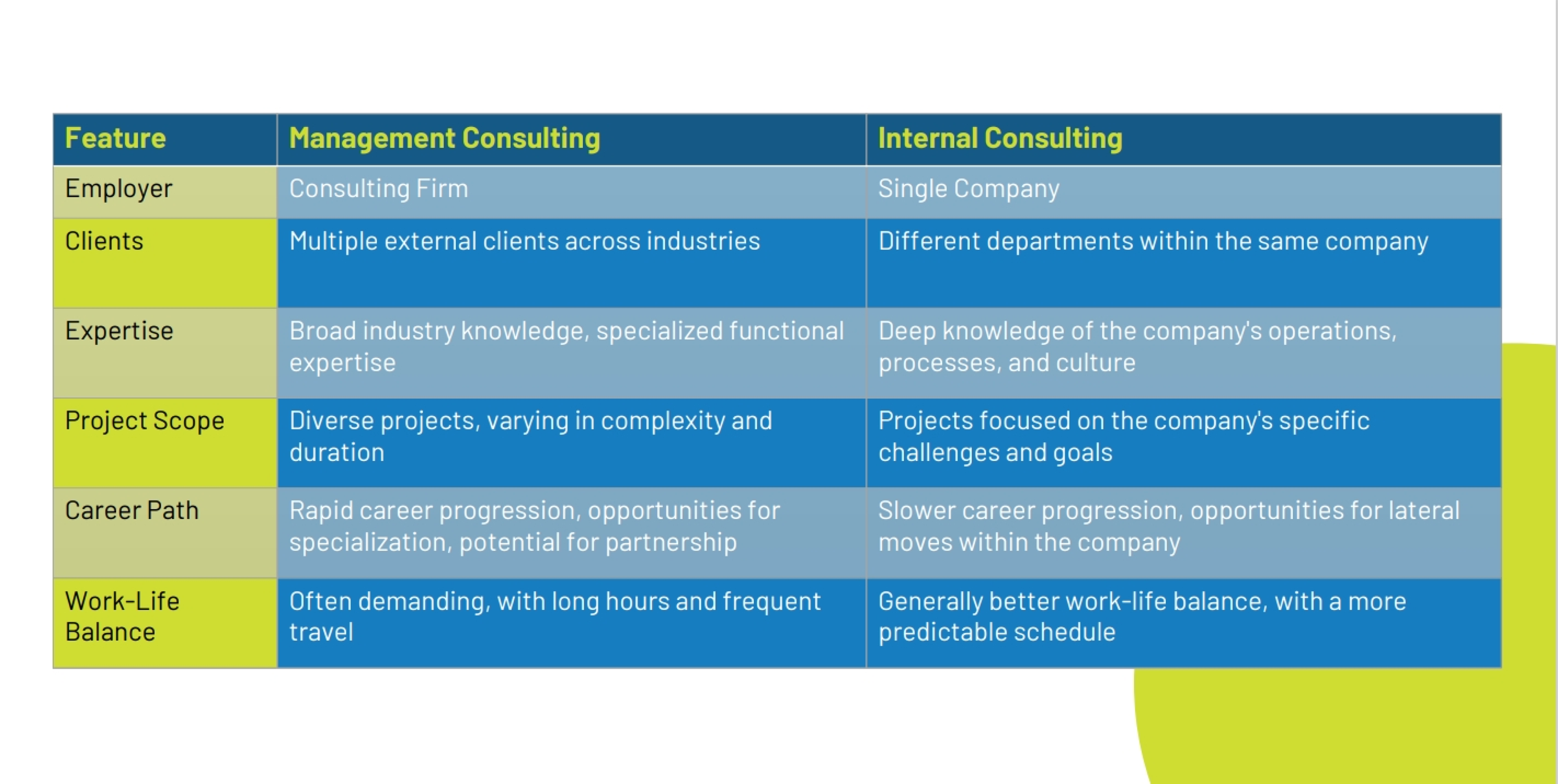12 July 2024
Management Consulting VS Internal Consulting: What's The Difference?

The consulting industry is experiencing unprecedented growth. Organizations across all sectors are increasingly turning to consultants to navigate complex challenges, optimize operations, and drive innovation. Factors fueling this demand include rapid technological advancements, globalization, heightened competition, and the need for specialized expertise. As businesses grapple with digital transformation, sustainability, and economic uncertainty, consulting services have become essential for gaining a competitive edge and achieving long-term success.
And in this developing landscape, you’ve probably heard about management consulting so many times. We’ve discussed what management consultants do, common misconceptions people may have about them, and the major skills you will need if you are on this career path. But what if we told you that, what you are involved in that you think is management consulting, might not exactly be management consulting? Before you throw stones, hold on for a moment. Have you ever heard about this thing called internal consulting? It may sound like a foreign concept, but it’s more common in today’s business landscape than you think. And if you’re thinking about picking up a career in consulting, you might want to take a step back and read this. Trust us.
As a leading business consulting firm in Nigeria with a solid standing in management consulting affairs, we think it’s important for us to let you know what internal consulting is, how it differs from management consulting, and how both paths are unique. We’ll also be answering the question that we know has been suddenly etched to the back of your mind: “Which one is better?”
First Off, What Is Management Consulting?
Management consulting, simply put, is a professional service where external experts provide advisory and implementation services to organizations to improve their business strategy, performance, and operations. If you’re a management consultant, it means you work for independent firms and offer a fresh, objective perspective to help clients address complex challenges.
As a management consultant, your role is multifaceted. You typically:
- Conduct in-depth research and analysis of your client’s business operations, financial performance, and market position.
- Identify problems, opportunities, and areas for improvement.
- Develop strategic plans and recommendations to address identified issues.
- Facilitate change management and implementation of new strategies, and
- Provide ongoing support and coaching to clients.
If you’re looking into a career here, you should prepare to find yourself working across industries like Fortune 500 companies, Government agencies, startups, and Non-profit organizations. In addition to this, your typical projects will involve strategy development and execution, operations improvement, organizational change, mergers and acquisitions, technology implementation, and risk management.
And here’s an interesting trivia. Management consulting is also known in some cases, as external consulting.
Now that we have established what management consulting is, we can discuss the next important question:
What Is Internal Consulting?
Unlike management consulting which deals with providing professional services to multiple firms, this equally potent counterpart deals with providing your services within a single firm. The firm that hired you specifically to be their in-house consultant. Internal consultants are employees within an organization who provide advisory services to different departments. They also act as problem solvers, leveraging their deep understanding of the company’s culture, processes, and people to offer solutions and drive improvements.
If you’re an internal consultant, you’ll find yourself working across various departments within one company, such as:
- Finance: Budgeting, financial analysis, cost reduction, process improvement.
- Operations: Supply chain optimization, process reengineering, productivity enhancement.
- Marketing: Market research, brand strategy, customer segmentation, sales performance improvement.
- HR: Talent acquisition, employee engagement, performance management, organizational development.
- IT: Systems implementation, IT strategy, cybersecurity, data analytics.
- Strategy: Business planning, strategic analysis, competitive intelligence.
In addition to this, your daily processes will involve process improvement, change management, technology implementation, data analysis, organizational design, and project management.
So we’ve provided a basic understanding of internal and management consulting. Let’s move on to the differences.
What Differentiates Management Consulting From Internal Consulting?
Although both services provide insight for others, they are unique in their ways. Below, we’ve provided a comprehensive diagram breaking down their differences, by feature.
So now we’ve told you what management and internal consulting are, and we’ve broken down the differences. It’s about time we answer that question that we know has been etched at the back of your mind.
Which One Is Better?
In all honesty, we don’t know. Both internal and management consulting are very unique in their way. Choosing between the two depends on several factors. If you’re seeking a dynamic career with exposure to various industries and rapid advancement, you might want to lean toward management consulting. But if you prioritize job stability, deep company knowledge, and a better work-life balance might prefer internal consulting. Additionally, career goals, desired level of industry exposure, and risk tolerance play a crucial role in making the right choice. Ultimately, aligning your aspirations with the specific opportunities and challenges of each path is essential for long-term career satisfaction.
In Conclusion…
Both management and internal consulting offer rewarding and impactful career paths. While management consulting provides exposure to diverse industries and rapid career growth, internal consulting offers stability, deep company knowledge, and a more balanced lifestyle. The optimal choice depends on your individual career goals, risk tolerance, and personal preferences. Ultimately, whether you thrive as an external problem solver or an internal strategic advisor, the consulting field offers a wealth of opportunities to drive organizational success and personal fulfillment. By carefully considering the differences between each path, you can make informed decisions about your career trajectory and find a fulfilling role that aligns with your strengths and aspirations.
Speaking of strengths and aspirations, did you know that one way to solidly define them, is by learning and development courses? Whether you’re looking into management or internal consulting, or you’re figuring out the reigns of human resources, it’s important to build them through learning. And this is where we come in. With our dedicated team of experts, we offer tailored training programs to meet your specific needs. Whether you want to identify a skill or build one, we’ve got your back. Contact us today, and let’s help you become a force to be reckoned with, no matter the career path you choose.
Join 2000+ Subscribers
Subscribe to Our newsletter to stay informed

UK: 5, Seacourt road, London. SE2 9UW
NIGERIA: 11a, Mojidi Street, off Toyin Street, Ikeja, Lagos.
GHANA: F393/4 Otwse street, Osu, Accra, Ghana
(+234) 901 278 1155
info@protenintl.com
Our Services
Latest Tweets
Lorem ipsum dolor sit amet, consectetur adipiscing elit. Donec nec metus libero. Aliquam non mauris.
Copyright © 2024 Proten. All Rights Reserved
Terms Of Service
Privacy
Cookies










